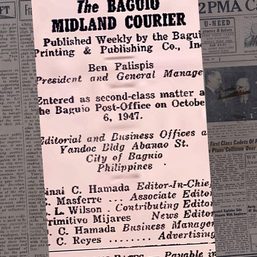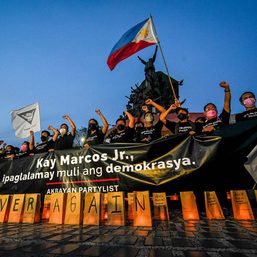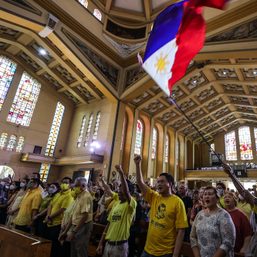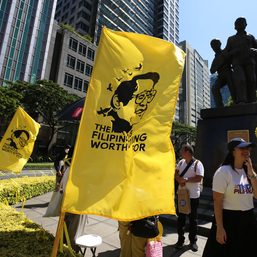SUMMARY
This is AI generated summarization, which may have errors. For context, always refer to the full article.
![[Newspoint] Repression – the story of our life](https://www.rappler.com/tachyon/2022/09/TL-Repression-September-9-2022.jpg)
Us a repressed nation? It’s a joke to even raise that question, and do so yet in a tone of incredulity. Repression, after all, is the story of our life. More useful should be a discussion in search of answers to why we are so constantly repressed and what we might be able to do about it.
Let me boil down to specifics – topical specifics – the questions we are confronted with, before I start having a go at them myself: How could we not have seen a Marcos coming twice in our lifetime or seen a procession of presidents cut out from similar repressive or otherwise notorious mold coming in the interim? History is never without clues to offer.
I imagine it hasn’t been easy for us to kick centuries of colonial habits and ways since we were left on our own, to rule ourselves by ourselves. Could democracy, indeed, have even begun to work in a lopsided society such as ours, one where a gulf in wealth, and consequently in privilege and opportunity, existed?
Naturally, the favorite natives of the old colonial patrons took power for themselves, and simply carried on ruling as their patron had done – by patronage. Is it any wonder that so little is changed from those days? Dynastic politics, cronyism, grand corruption, and, yes, repression – all this makes for screaming evidence.
Our preeminent hero would have himself felt scandalized to see his cry of revolt against colonial repression – There are no tyrants where there are no slaves – hijacked by the wrong side and to find home-grown, post-colonial swinish tyrants profiting from his pearly legacy.
Doubtless the tyrant who made the most profit was Ferdinand Marcos I. He had ruled by torture, murder, and plunder until we, his repressed subjects, found the limbs that had disappeared from under us 14 years before and finally enabled us to stand up to him and kick him, with his family, to Hawaiian exile. But, of course, he only went laughing all the way to the bank with 10 billion US dollars of our money, at the same time leaving us buried in foreign debt three times that amount.
Within less than six years, the Marcos family was back, and today Ferdinand Jr. is President, a sister is in the Senate, and a son in the Lower House. Ferdinand I himself lies among genuine heroes in their special graveyard, in a hole of honor secured on President Rodrigo Duterte’s worshipful sponsorship.
Few, indeed, could rival Duterte as worthy disciple to the master. It was also he who prepared the ground for a second Marcos coming and put the power institutions he had managed to coopt during his own presidential term – courts, Congress, military, police, auditors – at the service of his successor.
In exchange, President Ferdinand II carries on with his repression – his brutal drug war, his whimsical Red-tagging, his vengeances, notably against rights and freedom advocates – and his treasonous deals with China – the secession of our resource-rich and strategic western waters to it, its onerous loans, the special taxation and immigration favors for its businessmen and workers.
Which takes us back to my first question: How could we not have seen a Marcos coming twice, not to mention a procession of presidents from similarly repressive or otherwise notorious mold coming in the interim? How, if I may ask further, could we have gotten used to repression and even asked for more? It certainly looks as if we had, for didn’t we ourselves vote Ferdinand Jr. in? In fact – granting the Commission on Elections counted right this time around – hadn’t we done so with more than 31 million votes, giving him a 57% majority?
You and I may not be among those 31 million, but they make the numerical majority, and that’s what democracy, the deal we signed up for, is about – numbers. We could fancy ourselves the righteous minority, a position that should not be difficult to argue for anyone against Marcos. But, like it or not, we’re lumped together, all 110 million of us, as a nation, and, given that constitutional arrangement, it might make for a nice concession to nationhood to at least make an effort to know what the other side thinks, and to try to understand it, especially in matters decided by the vote.
So far as I have observed, many of those who voted for Junior did so for reasons personal, though not necessarily unrighteous. The more shortsighted among the poor – by the way, all poor are made shortsighted by their privations – would not pass up the seasonal opportunity to make money in exchange for their vote. But there are also those among them who dreamed of a more lasting and decent gain, a decided lift from the miserable existence to which they and generations before them had been consigned; made all too vulnerable by their desperation, they all fell easily for Marcos’s lies and improbable promises.
Those who are not poor at all but who picked Marcos all the same did so because they knew him, or knew people who knew him and felt they could connect to him for favors or profit, or liked him because they somehow identified with him – again, patronage. They are the sort to not care if Junior turned out to be his father’s true son, a full-fledged repressor. All they want is to come within his orbit of power, in other words, potential repressors themselves.
The Marcos poor are a more complex type. Poverty being in itself a form of repression, especially if caused or exacerbated by corrupt governance, all poor are victims of repression, too, therefore potential recruits for the cause. But if they proved unable habitually to see a Marcos type coming, theirs could be a case of perceptual blindness, from becoming, in this case, inured to repression, an impairment requiring a head treatment more sophisticated and rigorous than we can provide.
In any case, repression seems to me a perfect overarching theme on which to take Marcos Jr.’s regime of conspiracy with Duterte to task. It does cover all forms of assault on rights and freedoms. In fact, an anti-repression constituency with a standing protest army seems to me only begging to be organized. Indeed, it might well be the initial answer we’re looking for.
But I don’t know that, in such an exigency, it’s worthwhile looking for constituents among the 31 million supposed Marcos voters – they seem either too compromised or too self-interested or simply too confused to switch all too suddenly. The 19 million who stood opposite them should make for far better prospects – what they lack in number they more than make up for in quality of commitment, not to mention levels of understanding and energy. And all that, they proved to possess when more than a million of them poured out onto the streets in the same place at the same time wearing their heart on their sleeve in a show of people-power force not seen in a generation. – Rappler.com
The writer adapted the foregoing commentary from a talk he had given at the fifth anniversary of the Movement Against Tyranny, on September 3, 2022.
Add a comment
How does this make you feel?
![[Closer Look] ‘Join Marcos, avert Duterte’ and the danger of expediency](https://www.rappler.com/tachyon/2024/06/TL-trillanes-duterte-expediency-june-29-2024.jpg?resize=257%2C257&crop_strategy=attention)

![[Newspoint] A Freedom Week joke](https://www.rappler.com/tachyon/2024/06/20240614-Filipino-Week-joke-1.jpg?resize=257%2C257&crop_strategy=attention)







There are no comments yet. Add your comment to start the conversation.